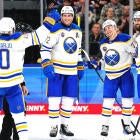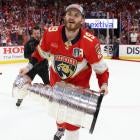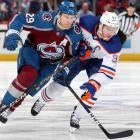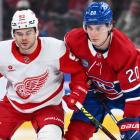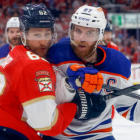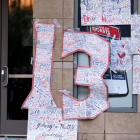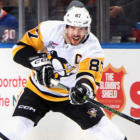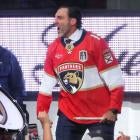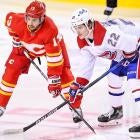
When veteran defenseman Johnny Oduya signed a two-year contract with the Dallas Stars this week he became the sixth different player to leave the Chicago Blackhawks this summer after playing in the Stanley Cup clinching game. He joined a list that already included Brad Richards, Antoine Vermette, Patrick Sharp, Kimmo Timonen and Brandon Saad. Some of them left as free agents, some of them were traded, one of them (Timonen) retired.
It's a significant chunk of the roster to replace (30 percent of the players that were in the lineup that night) and it was almost entirely because of financial reasons, something that just about every Stanley Cup winner eventually has to deal with in the salary cap era.
But how does that roster turnover compare to past winners?
To compare, I went back over the past 10 Stanley Cup winners (all in the salary cap era) and simply looked at how many players that were in the lineup for the Cup-clinching game ended up playing for different teams the next season. The average roster turnover for Cup winners: 3.3 players.
The only teams that lost more than five players were two of the past three Blackhawks teams.
Here is the complete breakdown.
2014-15 Chicago Blackhawks (6 -- so far): Brandon Saad, Patrick Sharp, Johnny Oduya Brad Richards, Antoine Vermette, Kimmo Timonen
Those six players combined to score 53 goals (mostly from Saad and Sharp) for the Blackhawks during the regular season in 337 man-games with the team.
With the Blackhawks still dealing with the salary cap crunch this list could continue to grow and perhaps include Bryan Bickell or Kris Versteeg.
2013-14 Los Angeles Kings (1): Willie Mitchell.
The veteran defenseman was the only player to leave the team following the Kings' second Stanley Cup win in three years, signing a free agent contract with the Florida Panthers.
2012-13 Chicago Blackhawks (3): Dave Bolland, Viktor Stalberg, Michael Frolik
Stalberg and Frolik left via free agency while Bolland, just days after scoring the Cup-clinching goal late in the third period of Game 6 to complete a wild comeback, was traded to the Toronto Maple Leafs for two draft picks. He would spend one season in Toronto before signing a huge contract with the Panthers the next offseason. Those three scored 19 goals in the lockout shortened season for Chicago.
2011-12 Los Angeles Kings: (0): Every player in the lineup in their Game 6 win over New Jersey returned the next season.
2010-11 Boston Bruins (3): Tomas Kaberle, Michael Ryder, Mark Recchi
Recchi, who was 42 during the season, retired after an incredibly successful career that saw him win three Stanley Cups with three different teams and score 577 goals. Ryder moved on as a free agent and signed with the Dallas Stars where he would score 35 goals the next season, while Kaberle, who was a trade deadline acquistion signed with the Carolina Hurricanes where he was a pretty big disappointment.
2009-10 Chicago Blackhawks (8): Dustin Byfuglien, Kris Versteeg, Antti Niemi, Andrew Ladd, John Madden, Brent Sopel, Ben Eager, Cristobal Huet
The original salary cap crunch in Chicago was massive and saw the team lose several key players, including both goaltenders and a significant chunk of their forward depth with Byfuglien, Ladd and Versteeg all getting traded in the days after their Cup win. That group combined to score 72 goals in 494 man-games during the 2009-10 regular season, and even though Versteeg eventually returned to the Blackhawks (and is still a member of the team today) Ladd has gone on to become the captain of the Winnipeg Jets while Byfuglien is one of the most productive defensemen in the league.
2008-09 Pittsburgh Penguins (4): Hal Gill, Rob Scuderi, Miroslav Satan, Mathieu Garon
Gill and Scuderi turned their reputation as Pittsburgh's "shutdown" defensive pairing into pretty significant free agent contracts the following offseason, while Scuderi would go on to win two more Stanley Cups with the Los Angeles Kings. Satan, a former 40-goal scorer in the NHL, settled into a fourth-line role with the Penguins after he was brought in over the summer to help replace the free agent loss of Marian Hossa.
The Penguins also lost Petr Sykora, who scored 25 goals in 2008-09, from this team, but he was not in the lineup for their Game 7 Stanley Cup clinching win against the Detroit Red Wings. He only appeared in seven playoff games.
2007-08 Detroit Red Wings (2): Dallas Drake, Dominik Hasek
Nothing really significant here. Drake was basically a fourth-liner on the Red Wings while Hasek lost his starting job early in the postseason to Chris Osgood. The Red Wings ended up adding Marian Hossa to the roster over the summer following their win and even though they somehow put an even better team on the ice the next season, they were unable to repeat as champions, dropping Game 7 of the Stanley Cup Final to Pittsburgh.
2006-07 Anaheim Ducks (2): Dustin Penner, Shawn Thornton
The Ducks lost Penner as a restricted free agent when he signed an offer sheet with the Edmonton Oilers that nearly resulted in Brian Burke and Kevin Lowe fighting in a barn. The Ducks received three draft picks (first, second and third round) for Penner. Thornton would go on to become a fan and media favorite in Boston and win another Stanley Cup with the Bruins.
2005-06 Carolina Hurricanes (4): Matt Cullen, Mark Recchi, Aaron Ward, Martin Gerber
Doug Weight should also be included in here having played in 23 postseason games for the Hurricanes, but an injury forced him to miss the clinching Game 7 win. He was one of the Hurricanes' big trade deadline acquisitions (Recchi was the other) that helped them win the first Stanley Cup in franchise history. Martin Gerber started the majority of the games in net during the regular season but ended up losing the starting job to rookie Cam Ward in the playoffs. Ward was incredible and was perhaps the single biggest reason the Hurricanes were able to win the Cup.








